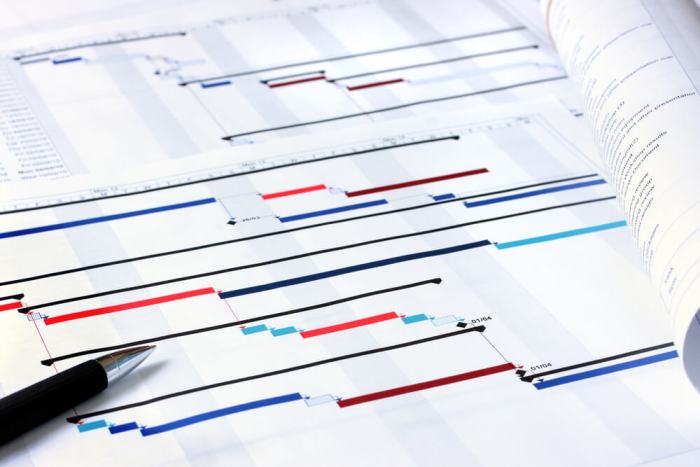What is time management?
Time management is the ability to control and plan your time to successfully achieve the goals set for certain tasks.
Every person in the world uses time management every day. During the day you set certain goals and you plan your actions to achieve these goals. Whether you go to the airport 2 hours earlier to catch your flight or you boil your pasta for exactly 8 minutes to get the perfect consistency, you use time management.
In personal life, you manage your time and you are responsible for your results. But in a corporate environment, time management works differently. A work of a group of people should be organised in a certain way to achieve their common goal – efficiency.
Why time is important in project management?

Any company, big or small, usually has a project manager or a person with a special set of management skills. A project manager, or PM, usually helps the team handle the workflow they’ve been assigned and keep on track of deadlines. A project manager is responsible for the performance of the whole team because planning, time tracking and task management are controlled by a PM.
A PM’s everyday responsibilities include meetings, planning, estimations, and communications with clients and the team. This can feel like an insurmountable task if badly organised.
Bad time management is a risk which should be considered very seriously. With poor organisation skills, it may be difficult to manage a team within tight deadlines. Any project delays directly influence the budget and resources. Moreover, poor time management can lead to stress and anxiety within the team.

The key to effective time management is not working more hours but using these hours efficiently. This means that your team should be focused on completing more tasks in less time.
Here are some tips which will help you to manage your time effectively:
1. Plan ahead
When you have lots of things to do, the best way to organise yourself is to create a plan. Planning your next day tasks at the end of a day helps to structure your time. First of all, if you plan your day you do not need to spend time remembering things-to-do in the morning. And the time saved can be spent on completing some of the tasks, focusing or, simply, on good additional 15 minutes of sleep in the morning for example. 🙂
But when you are managing several projects you need to create a project plan to be able to manage all the people involved in this project. Using such tools as a Gantt Chart or Logic network will help you to make different requirements, assignments, goals, deadlines, timeline and resources visible for the management and the team.
2. Prioritise tasks
Everyone has days when things become a little overwhelming. You do not have time to complete any of your tasks and you keep getting notifications about more tasks assigned to you.
Creating a prioritized to-do list can be a solution in this situation. Setting priorities will help you to structure your tasks according to their urgency, importance and effort you need to invest in them.
Splitting small tasks which can be done from large ones which demand lots of concentration and resources can help you to complete them on time.
Below you can see an example of prioritising. This will help you to understand what you need to focus on. Before starting with your tasks, assign to them a relevant category from the list below:
- Important and urgent – you need to do them ASAP
- Important and not urgent – important to complete but can wait
- Not important and urgent – usually are delegated within the team
- Not important and not urgent – these tasks can be skipped or reviewed whether they should be in your list
3. Focus on one task
Multitasking is a great skill but if you jump from one project to another one you can easily lose your concentration. We all are humans and our brain needs some time to switch from one task to another. Trying to do many things at the same time reduces your productivity. As a result, you can often feel like you’ve done so many things but made no headway. Another risk with multitasking is it increases your chance of making mistakes. Think of it as juggling. The more balls you add, the greater the chance you’ll drop them.
Instead, try focusing on one of the tasks at a time and only switch to the other one after completing the first one. Do this and you will notice how quickly your schedule will run out of tasks.
4. Avoid distractions
A big part of PM’s job is communication either with clients or team members that is why avoiding distractions can be tricky. Even though communications take almost 90% of the PM’s time there are lots of other tasks which demand concentration and focus such as reports and documentation.
Set some time a day for yourself when you can focus on your own tasks. For example, you can ask your colleagues not to disturb you when you are wearing your headphones (if listening to music helps you to concentrate, of course). Also, try to put your phone away, snooze the notifications and especially stay away from social media when you need to concentrate.
5. Delegate tasks
Learn to trust people. Most of the people in your team have the relevant skills to get the job done. Brief your colleagues about a task and make sure they understood what needs to be done and when it needs to be done by. Use this time to work on more important and urgent tasks.
6. Set shorter deadlines
Setting a shorter timeline for yourself can help you to avoid missing deadlines. We all have this feeling when the deadline is far and we have all the time in the world to complete the task. But, the more time you have for a given task, the greater the chance that you’ll procrastinate instead of using that time to get your job done earlier.
To avoid this situation, try to finish the task earlier. Plan your timeline and complete your project far before the deadline. The time you saved can always be used for additional checks and amendments which can improve your results.
7. Know your limits
Learn to adequately estimate the amount of work you can do in a given timeframe. If you are overwhelmed with things feel free to speak to your supervisor or line manager. If you have a lot on your plate and your manager gives you more tasks to do, ask about priorities. Be honest with them.
Only agree to new assignments when you are confident that you will be able to complete your old ones on time.
8. Reflect on your results
At the end of the day, use 15 minutes and think about what you did today. Highlight what you’ve learned and achieved and reflect on what went wrong. Summarising will not only help you to keep on top of what remains to be done but also find some areas for improvement.
However, if you want to make good use of someone’s time, make sure that you first organise your own time. Only people who can effectively manage themselves can manage a group of people. Managing people is a huge responsibility, especially if you need to deliver good results to a strict deadline.
Using these tips will help you to make the process of planning and managing your team easier. Implementing these strategies in your management will also make tasks, deadlines and resources visible for your team. Moreover, using these recommendations in combination with various project management tools will let you keep on track of your team’s workflow, timeframes and overall performance.
Contact us to find out more about how we can project manage your digital marketing. We work with dynamic development, design and digital teams to create bespoke solutions that are agile and reactive.
